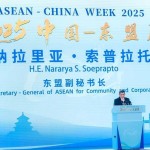Total number of posts 463.

On September 12, at the 2022 ASEAN Leadership and Partnership Forum, the Cambodian Prime Minister affirmed that the implementation of the RCEP Agreement contributes to a sustainable and inclusive economic recovery.
Accordingly, at the 2022 ASEAN Leadership and Partnership Forum, Cambodian Prime Minister Samdech Techo Hun Sen affirmed that the implementation of the Regional Comprehensive Economic Partnership (RCEP) has been contributing to sustainable and inclusive economic recovery after the Covid-19 pandemic. The Association of Southeast Asian Nations (ASEAN) must "make the most of free trade agreements, especially the RCEP Agreement, which is the largest free trade agreement in global history".
Cambodian Prime Minister Hun Sen, as ASEAN Chair in 2022, said ASEAN must continue to promote economic integration and turn the bloc into an attractive and dynamic center of trade and investment by reducing tax and non-tax barriers. He also officially announced the opening of the ASEAN Economic Club.
The ASEAN Economic Club will play an important role in promoting closer ASEAN economic integration by contributing to the monitoring, evaluation, consultation, etc. on the implementation of the agreements that the ASEAN member states have reached, especially for some free trade agreements, RCEP Agreements, and other agreements related to economic pillars.
Cambodia's Deputy Minister of Commerce and spokesman Penn Sovicheat said the RCEP has further facilitated cross-border trade and investment flows and created a large market. RCEP is a comprehensive agreement, covering trade in goods, trade in services, investment, economic and technical cooperation, dispute settlement, e-commerce, competition, and intellectual property. This trade agreement has promoted multilateralism and free trade and all participating countries will benefit from it in the long run.
Kin Phea, Director General of the Institute of International Relations at the Royal Academy of Cambodia, said that the RCEP is multilateral trade cooperation and its structure is really meant to benefit all participating countries. RCEP is instrumental in subverting escalating unilateralism as it pulls all bilateral free trade agreements into one economic domain, under a common trade ruling.
Joseph Matthews, Senior Professor at BELTEI International University in Phnom Penh, said that RCEP has been creating a great impetus for the regional and global economic recovery in the post-Covid-19 pandemic. This massive trade deal has huge potential for all participating countries to boost trade and investment relations and accelerate their economic recovery from the pandemic.
According to RCEP, all member countries will reap long-term benefits by deeper integration into regional and global supply chains, while creating new jobs for their people. Effective in January 2022, the super-regional trade agreement includes 15 Asia-Pacific countries including 10 ASEAN member states, namely Brunei, Cambodia, Indonesia, Laos, Malaysia, Myanmar, Philippines, Singapore, Thailand, and Vietnam, and 5 trading partners are China, Japan, Korea, Australia, and New Zealand.
Source: Công Thương News














